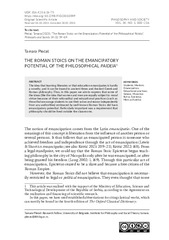The Roman Stoics on the Emancipatory Potential of the Philosophical Paideia
Rimski stoici o emancipatorskom potencijalu filozofskog obrazovanja
Чланак у часопису (Објављена верзија)
Метаподаци
Приказ свих података о документуАпстракт
The idea that learning liberates or that education emancipates is hardly a novelty, and it can be traced to ancient times and Ancient Greek and Roman philosophy. Thus, in this paper, we aim to express that some of the ideas (like the idea that women and men are equally subject to moral virtue because of their rationality) and educational practices (such as those that encourage students to use their voices and reason independently from any authorities) embraced by well-known Roman Stoics did have emancipatory potential. Particularly important was a requirement that philosophy should be lived outside the classrooms.
Ideja da učenje oslobađa ili, preciznije da obrazovanje emancipuje teško da predstavlja neku novinu, budući da se ta ideja može pratiti sve do antičkog perioda, odnosno grčke i rimske filozofske misli. U ovom radu nastojimo da pokažemo da su neke od ideja (poput ideje da su i žene i muškarci zbog svoje racionalne prirode podjednako podložni vrlini) i obrazovnih praksi (poput prakse kojom se podsticalo iznošenje sopstvenih stavova i korišćenja vlastitog razuma, bez oslanjanja na spoljne autoritete) koje su zastupali neki od dobro poznatih rimskih stoika imale emancipatorski potencijal. Posebnu važnost je nosio zahtev u skladu sa kojim filozofija treba da se živi i van učionica.
Кључне речи:
Students / Mentors / Emancipation / Educational practices / Seneca / Musonius Rufus / Epictetus / Marcus AureliusИзвор:
Filozofija i društvo / Philosophy and Society, 2023, 34, 1, 59-69Издавач:
- Beograd : Institut za filozofiju i društvenu teoriju
URI
https://journal.instifdt.bg.ac.rs/index.php/fid/article/view/1539http://rifdt.instifdt.bg.ac.rs/123456789/2802
Колекције
Институција/група
IFDTTY - JOUR AU - Plećaš, Tamara PY - 2023 UR - https://journal.instifdt.bg.ac.rs/index.php/fid/article/view/1539 UR - http://rifdt.instifdt.bg.ac.rs/123456789/2802 AB - The idea that learning liberates or that education emancipates is hardly a novelty, and it can be traced to ancient times and Ancient Greek and Roman philosophy. Thus, in this paper, we aim to express that some of the ideas (like the idea that women and men are equally subject to moral virtue because of their rationality) and educational practices (such as those that encourage students to use their voices and reason independently from any authorities) embraced by well-known Roman Stoics did have emancipatory potential. Particularly important was a requirement that philosophy should be lived outside the classrooms. AB - Ideja da učenje oslobađa ili, preciznije da obrazovanje emancipuje teško da predstavlja neku novinu, budući da se ta ideja može pratiti sve do antičkog perioda, odnosno grčke i rimske filozofske misli. U ovom radu nastojimo da pokažemo da su neke od ideja (poput ideje da su i žene i muškarci zbog svoje racionalne prirode podjednako podložni vrlini) i obrazovnih praksi (poput prakse kojom se podsticalo iznošenje sopstvenih stavova i korišćenja vlastitog razuma, bez oslanjanja na spoljne autoritete) koje su zastupali neki od dobro poznatih rimskih stoika imale emancipatorski potencijal. Posebnu važnost je nosio zahtev u skladu sa kojim filozofija treba da se živi i van učionica. PB - Beograd : Institut za filozofiju i društvenu teoriju T2 - Filozofija i društvo / Philosophy and Society T1 - The Roman Stoics on the Emancipatory Potential of the Philosophical Paideia T1 - Rimski stoici o emancipatorskom potencijalu filozofskog obrazovanja IS - 1 VL - 34 SP - 59 EP - 69 DO - 10.2298/FID2301059P ER -
@article{
author = "Plećaš, Tamara",
year = "2023",
abstract = "The idea that learning liberates or that education emancipates is hardly a novelty, and it can be traced to ancient times and Ancient Greek and Roman philosophy. Thus, in this paper, we aim to express that some of the ideas (like the idea that women and men are equally subject to moral virtue because of their rationality) and educational practices (such as those that encourage students to use their voices and reason independently from any authorities) embraced by well-known Roman Stoics did have emancipatory potential. Particularly important was a requirement that philosophy should be lived outside the classrooms., Ideja da učenje oslobađa ili, preciznije da obrazovanje emancipuje teško da predstavlja neku novinu, budući da se ta ideja može pratiti sve do antičkog perioda, odnosno grčke i rimske filozofske misli. U ovom radu nastojimo da pokažemo da su neke od ideja (poput ideje da su i žene i muškarci zbog svoje racionalne prirode podjednako podložni vrlini) i obrazovnih praksi (poput prakse kojom se podsticalo iznošenje sopstvenih stavova i korišćenja vlastitog razuma, bez oslanjanja na spoljne autoritete) koje su zastupali neki od dobro poznatih rimskih stoika imale emancipatorski potencijal. Posebnu važnost je nosio zahtev u skladu sa kojim filozofija treba da se živi i van učionica.",
publisher = "Beograd : Institut za filozofiju i društvenu teoriju",
journal = "Filozofija i društvo / Philosophy and Society",
title = "The Roman Stoics on the Emancipatory Potential of the Philosophical Paideia, Rimski stoici o emancipatorskom potencijalu filozofskog obrazovanja",
number = "1",
volume = "34",
pages = "59-69",
doi = "10.2298/FID2301059P"
}
Plećaš, T.. (2023). The Roman Stoics on the Emancipatory Potential of the Philosophical Paideia. in Filozofija i društvo / Philosophy and Society Beograd : Institut za filozofiju i društvenu teoriju., 34(1), 59-69. https://doi.org/10.2298/FID2301059P
Plećaš T. The Roman Stoics on the Emancipatory Potential of the Philosophical Paideia. in Filozofija i društvo / Philosophy and Society. 2023;34(1):59-69. doi:10.2298/FID2301059P .
Plećaš, Tamara, "The Roman Stoics on the Emancipatory Potential of the Philosophical Paideia" in Filozofija i društvo / Philosophy and Society, 34, no. 1 (2023):59-69, https://doi.org/10.2298/FID2301059P . .



